







Home » What To Do After A Car Accident That’s Not Your Fault
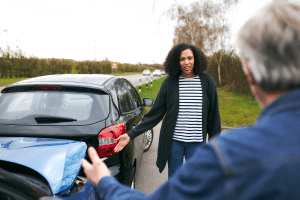
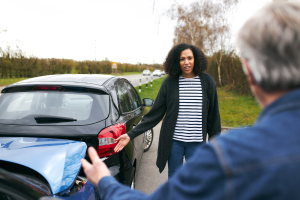
Were you in an auto accident that’s not your fault? Facing the legal process may seem intimidating. There are things you can do to increase your chances of getting fair compensation for physical injuries and pain, suffering, and other financial losses.
Read on to learn what to do after a car accident that’s not your fault. Also, learn about how to protect your rights. Your experienced car accident lawyers will walk you through the steps and help you get the compensation you deserve. They will take care of everything from when you make the call until the final settlement.
Table of Contents
ToggleAccording to the National Highway Traffic Safety Administration (NHTSA), there were over 5 million police-reported car accidents in the United States in 2020, a 22% decrease from 2019.
Many people don’t realize how many ways their behavior can put them in danger when they’re behind the wheel. While driving, here are some things to watch out for:
Distracted Driving
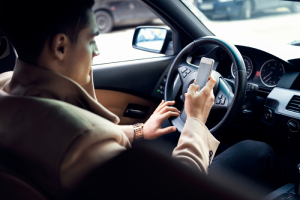
Distracted driving is one of the leading causes of car accidents. Contrary to popular belief, the brain cannot focus on more than one task. This means that when a driver is texting, talking on the phone, grooming, reading, or even eating while driving, their brain switches between tasks and cannot focus on what’s ahead.
Drunk Driving
Drunk driving is responsible for 29 deaths per day on average. However, recent educational efforts have decreased the number of drunk driving deaths.
Speeding
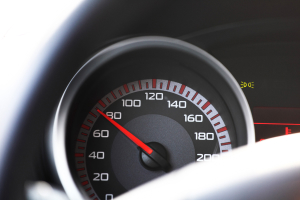
Running late for work, keeping up with traffic, or unintentionally driving over the speed limit are among the leading causes of speeding-related accidents.
Stop Signs and Running Red Lights
Running a red light or a stop sign causes approximately 40% of car accidents at intersections. It’s not worth risking injuring or even killing yourself or others to avoid the one to two-minute (or less) wait.
Reckless Driving
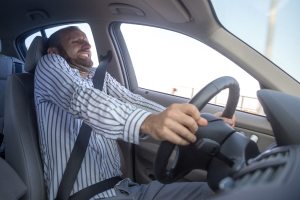
Switching lanes too quickly, disregarding the safety and property of others, and purposefully failing to follow cautionary measures are just a few examples of reckless driving.
Aggressive Driving
Any combination of traffic offenses that endangers other drivers or property, including speeding, is considered aggressive driving.
Fatigue
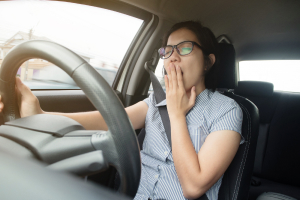
Sleepiness, drowsiness, or outright exhaustion can impair a driver’s ability to respond, react, or discern road conditions competently.
Road Condition
The physical condition of the road can have a significant impact on the cause of a car accident. Inadequate road maintenance can reduce wheel traction or make it difficult for the car to stop in time to avoid a hazard.
Weather Condition
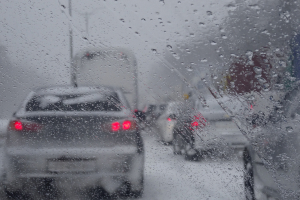
For weather conditions, ice or moisture, whether from rain or snow, can make a roadway slippery, affecting driving conditions. Visibility can also decrease when fog, heavy rain, or snow.
Mechanical Performance
The mechanical performance of your vehicle can also cause accidents. Failure to properly maintain the brake system or tires can impair your ability to stop ahead of (or avoid) a hazard.
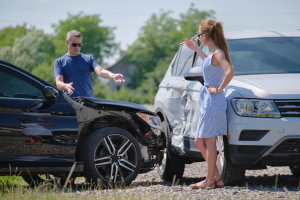
When an accident happens, you’re probably unsure what to do next. To help, here’s some information on the first steps you should take to ensure that you’re protected and prepared for any further action.
If you are involved in an accident that was not your fault, you will want to have evidence of how the accident occurred. Accidents can result in severe and costly damage. Proof of how a crash occurred may be necessary to ensure that the at-fault driver is held accountable for paying for it.
Immediately following a crash, you should take critical steps at the scene to gather information that may be useful later. The following are examples:
After time has passed, it may be difficult or impossible to obtain this information, so gather as much detail as possible at the scene.
Visiting the doctor is a good idea regardless of whether you’re hurt or not, just in case, and it’s vital if you are hurt. You may be able to handle a few scratches on your own, but if you were in an accident of any kind, you risk injuring yourself further if you refuse medical treatment. If you know other people involved, get their contact information and make sure a doctor also treats them. If you don’t know who else was involved in your accident, a car insurance company can help ensure they’re safe.
The rules governing who is responsible for covering the costs of accident losses differ from state to state.
In certain jurisdictions, known as no-fault states, your insurer may cover medical bills and partially lost wages if the damage from a collision is minor. Whoever caused the accident, every driver relies on their insurer for compensation up to a specific limit, such as $10,000.
In these states, there isn’t much difference between what to do after a car accident that wasn’t your fault and one that was. Even in no-fault states, the at-fault driver can be held liable for property damage.
In other states, however, the driver who caused the accident is obligated to pay for property damage, medical bills, and other losses resulting from injuries, such as lost wages and emotional distress.
Understanding the rules that will likely apply to your situation is critical to determine whether you should expect payment from your insurer or the at-fault driver’s insurance.
It would help if you also got in touch with your insurance provider, even though you might not be to blame for the collision. It proves that you made a good-faith effort to report the accident. It will be helpful if you file a collision claim after the at-fault driver’s insurer disputes liability for the collision or their insurance was invalid at the time of the incident.
Car insurance companies occasionally request that you get their approval before moving forward with vehicle repairs and injury treatments. Before moving forward with repairs, make sure the insurance company has, at the very least, acknowledged liability. Obtain this authorization in writing or via email.
Most importantly, when a car accident isn’t your fault, speak with a car accident lawyer as soon as possible. They can help you determine what kind of claim you have and what your next steps should be. From whether or not you’d like to pursue legal action against the other party and how much would be enough compensation for you to whether or not your insurance company is doing its job in compensating for your losses. When it comes to all of these things, it’s best to have a professional evaluation done by someone who knows both how insurance companies work and how courts work.
Accidents that occur in at-fault states
In at-fault states, the at-fault driver’s bodily injury liability coverage pays for the hospital bills of the other driver. In an at-fault state, a driver compensates the victim (or victims) for their damages. One can accomplish this through an insurance claim or the at-fault driver paying the other party out of pocket.
If you cause an accident, you can use your insurance to cover the costs. Your insurance policy’s property damage liability portion will cover the damages to the other driver’s vehicle. Similarly, your insurance’s bodily injury liability portion will cover the other driver’s and passengers’ medical expenses if injured. The insurance coverage will only pay up to the policy limits, and you may be personally liable for any costs that exceed that amount. Your insurance policy may also pay for damages to your vehicle, depending on the extent of your coverage. The insurance may cover your injuries or the injuries of any passengers in your car.
Accidents that occur in no-fault states
Personal injury protection (PIP) insurance covers your own medical bills in no-fault states. No-fault is not the same as “not-at-fault,” as “not-at-fault” accidents can occur in both no-fault and at-fault states.
A “no-fault” accident occurs when a car accident occurs in a state that has no-fault laws. Despite the name, this does not imply that no one is to blame. On the other hand, no-fault insurance means everyone’s insurance will pay for their medical bills (up to the policy limit). It is produced by insurance regardless of who caused the collision. It is only valid for physical injury-related damages. Even in a no-fault state, the driver who is “at fault” in an accident is still liable for any property damage caused by the accident.
In no-fault states, a driver injured in a car accident files an insurance claim to receive compensation for their physical injuries. It means that a vehicle accident victim can file a claim. This claim is intended to cover minor injuries without proof of who caused the car accident.
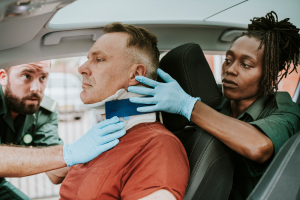
Some complications may arise and disrupt your life after the collision, including:
Soft tissue injuries can result in severe pain and discomfort, manifesting as stiffness, soreness, swelling, and bruises. Due to the force of vehicle collisions and the force they exert on the occupants, these kinds of injuries are frequent in car accidents. The force generated during an accident may cause car occupants to be violently jolted or thrashed around, depending on how severe the crash is.
Traumatic brain and head injuries are some of the most common and severe injuries that result from a car accident. The severity of the outcome of a TBI depends on the amount and location of damage to the brain. A brain injury can range from mild to severe or even critical.
A car accident can fracture or break any bone in the body. The force of the collision, external objects striking the body, being thrown forward or backward, having the limbs and bones twisted or bent unnaturally, being thrown from the car, or getting crushed in the crash are the usual causes of the breaks.
There are several qualifications and benefits that an experienced car accident attorney can provide you. Since they know the laws and how to interpret them, they can help you receive the compensation you need and deserve when you have been in an accident. They will understand how insurance companies work and will be able to prevent you from being taken advantage of.
Here are some of the benefits a qualified attorney can provide for you after an accident occurs:

Don’t be hassled with insurance companies or medical bills. Get the help you deserve now! Our car accident lawyers at Conboy Law can handle everything on your behalf. We will ensure to handle your claim correctly and receive fair compensation.
Our legal team has successfully handled thousands of injury claims, including car accidents, truck accidents, motorcycle crashes, and pedestrian collisions. We aim to ensure you get fully compensated for all your damages and losses so you can get back on the road and move on with your life. Call our law office at (312) 586-9674 or fill out our online contact form for a free immediate consultation.
Search
If you or a loved one has been injured, don’t hesitate to contact our injury attorneys today!
"*" indicates required fields



60 W Randolph St. 4th
Floor Chicago, IL 60601
Monday to Friday:
Saturday:
Sunday:
Available For Calls
8:00 AM – 8:00 PM
9:00 AM – 5:00 PM
Closed
24/7
Chicago and surrounding areas